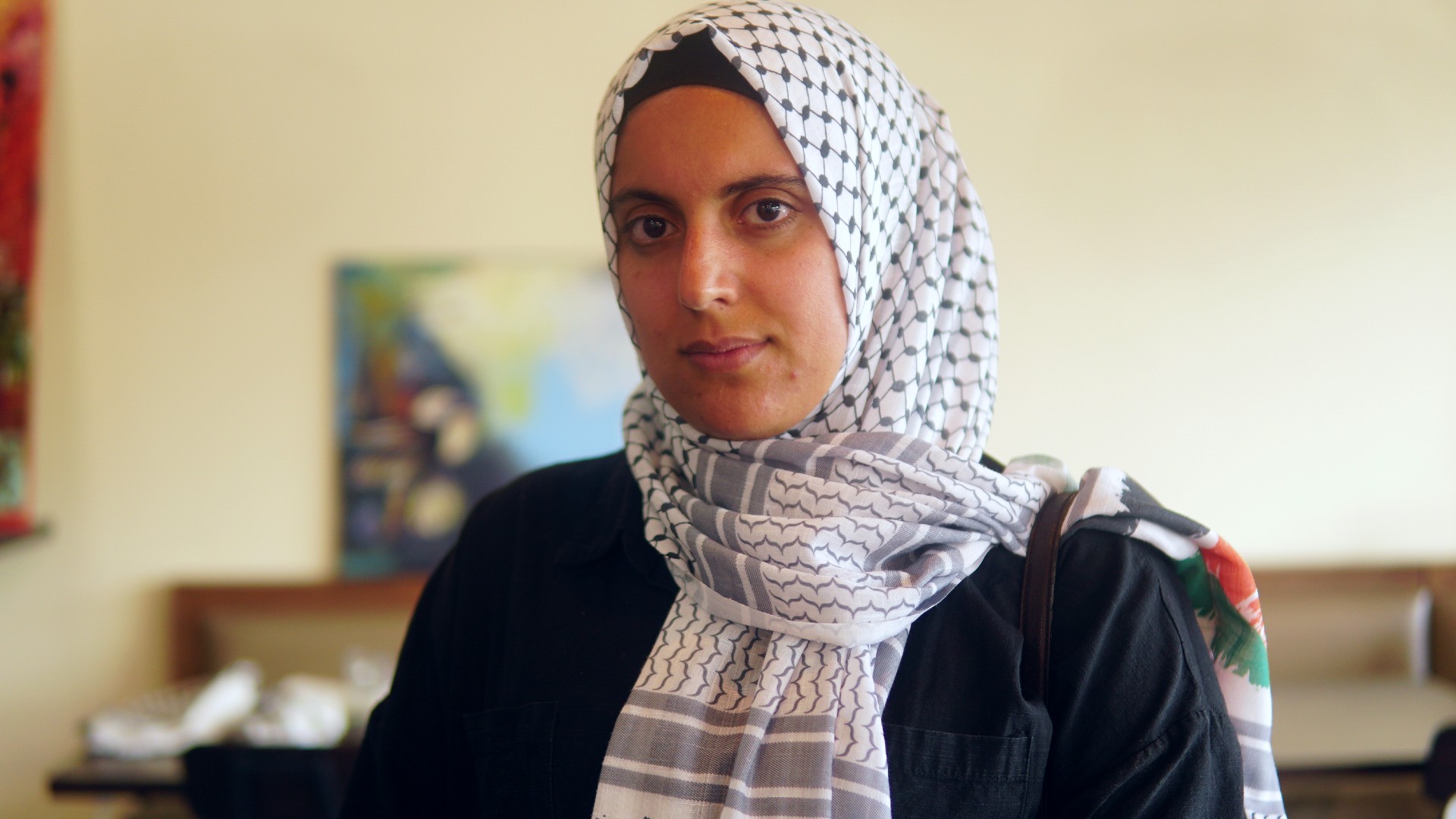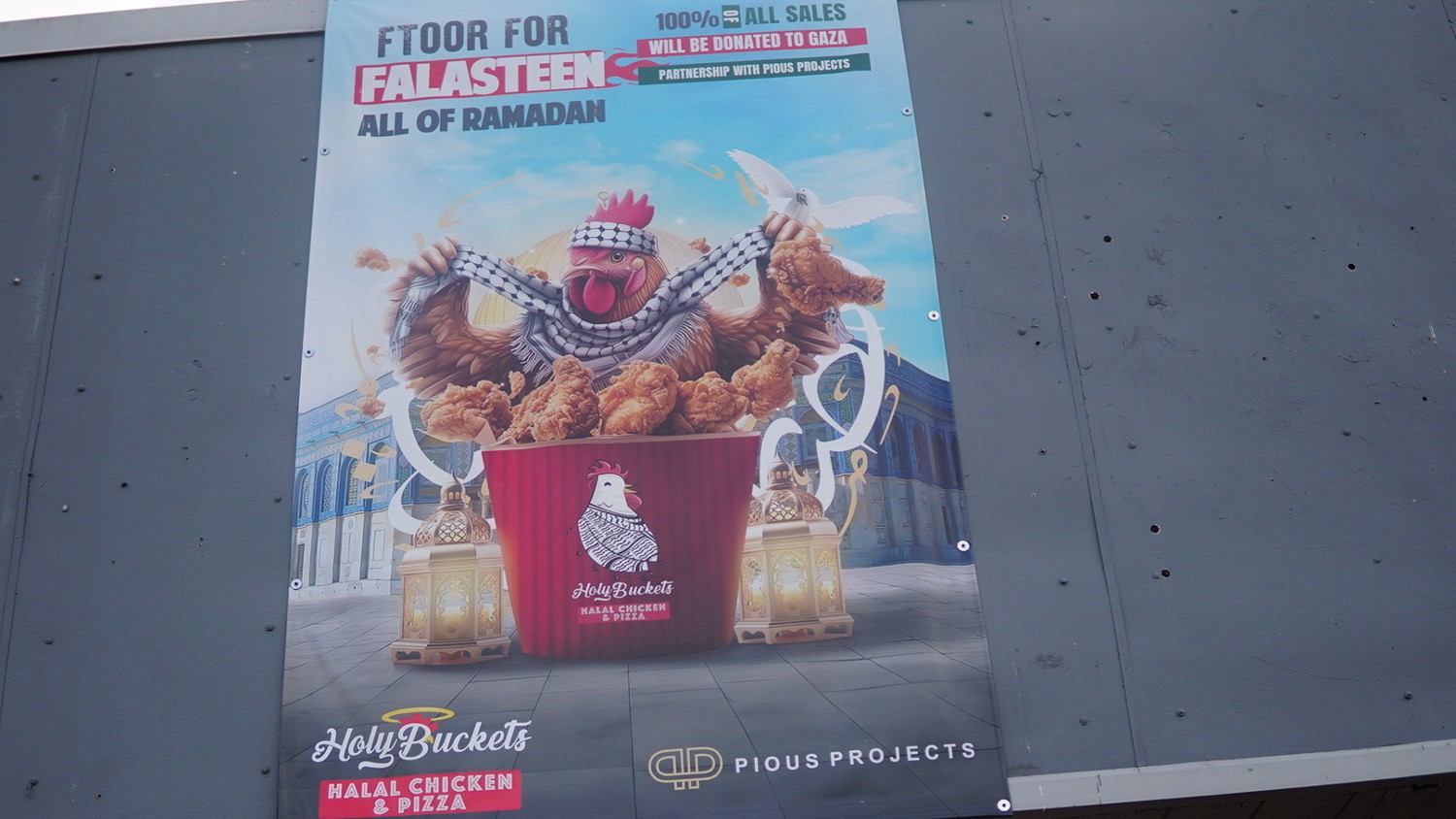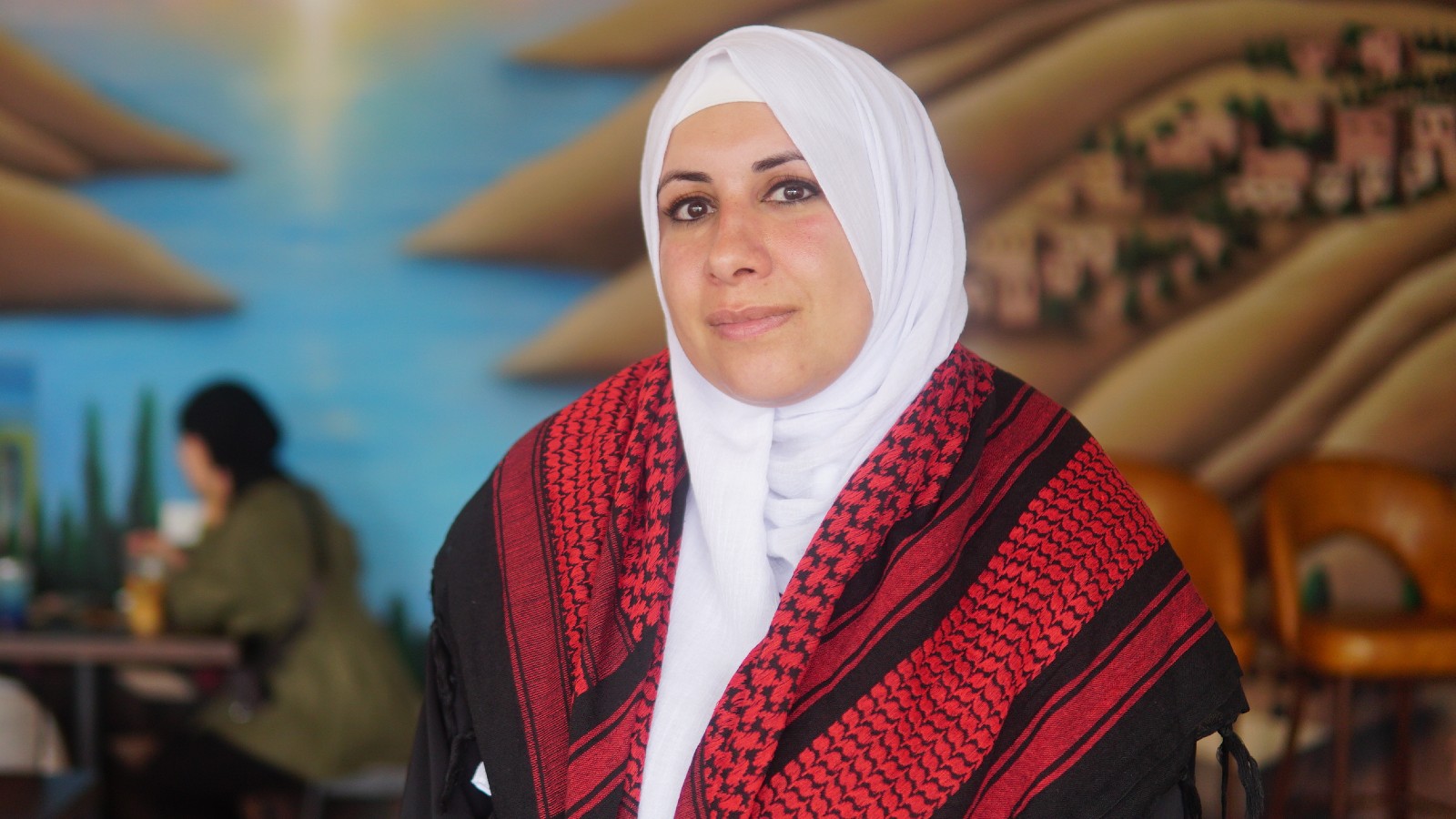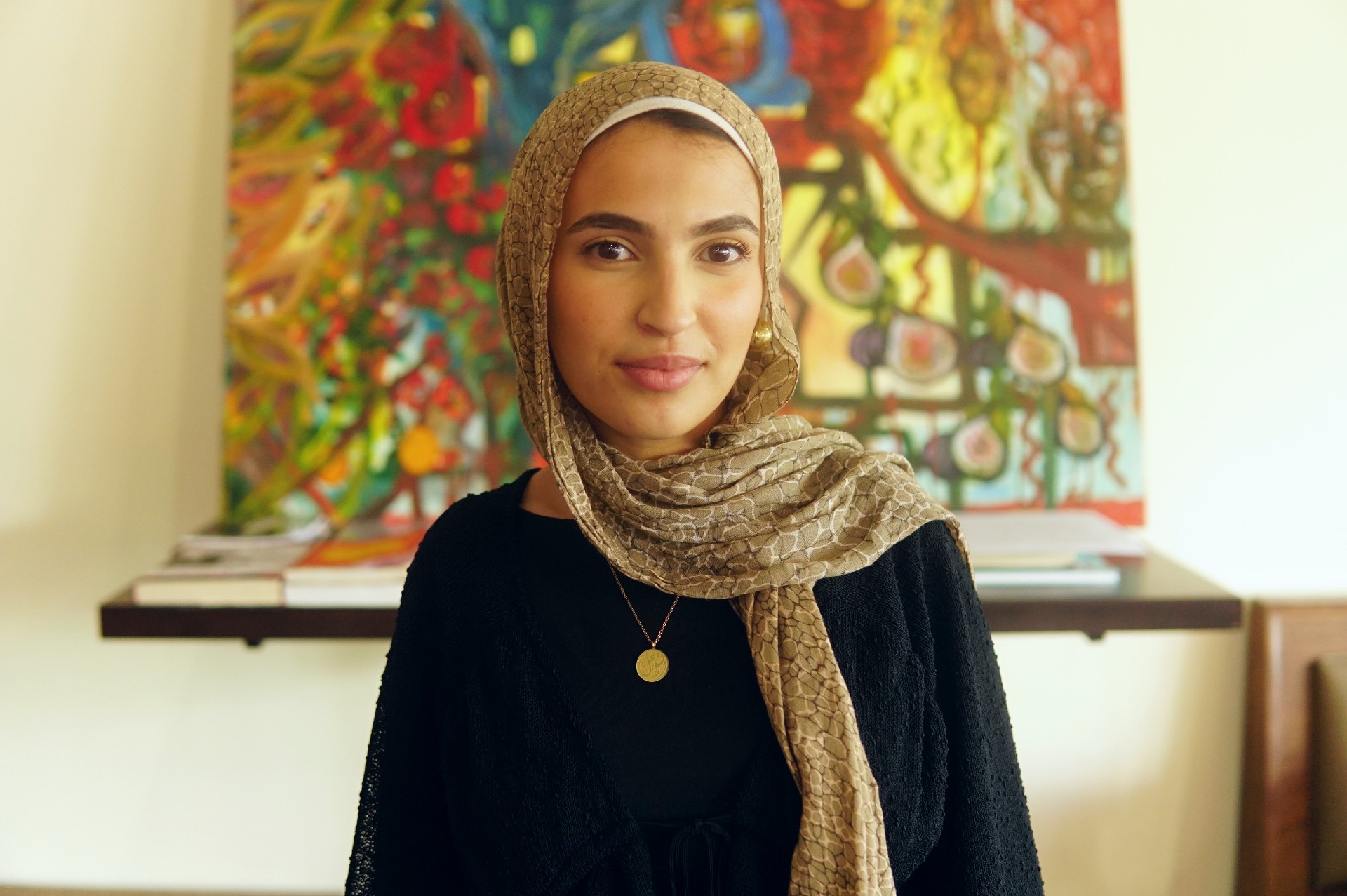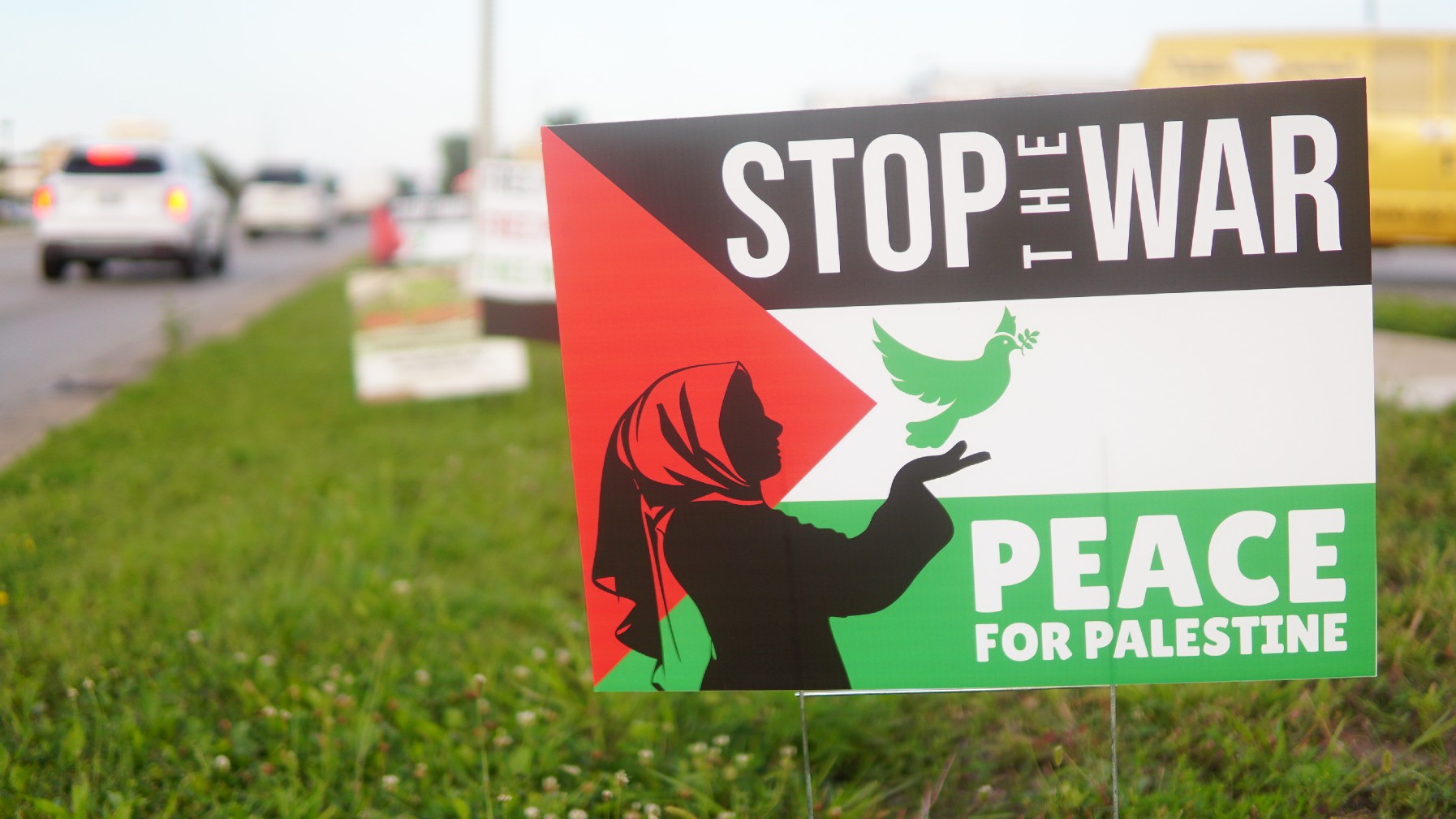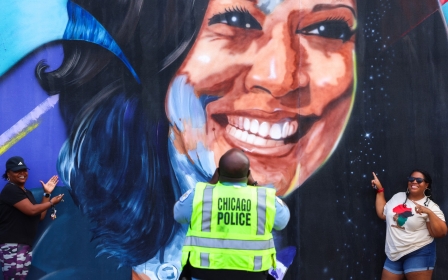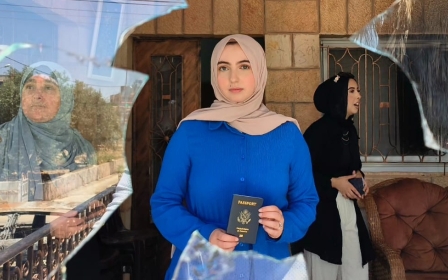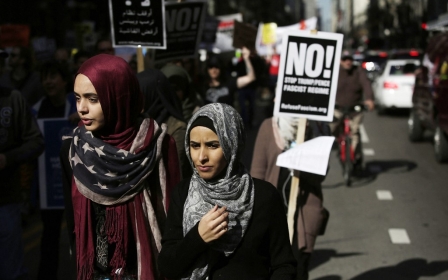In Chicago's Little Palestine, signs of Israel's war on Gaza are everywhere
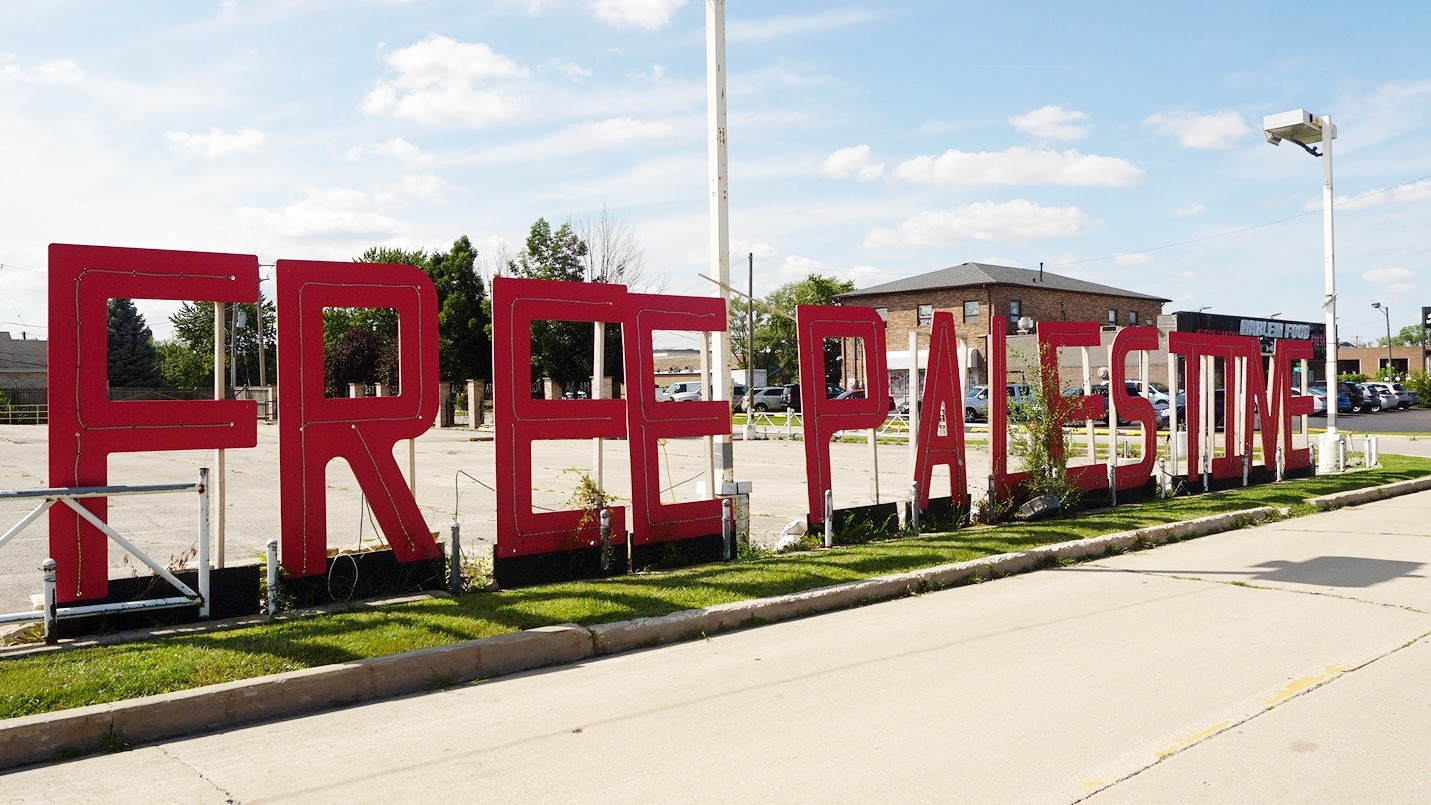
In Little Palestine, symbols of the war being waged on the people of Gaza are everywhere.
They are on the lawn signs planted alongside the main thoroughfare. They are on the giant "Free Palestine" LED sign on Harlem Avenue. Palestinian flags, too, are everywhere. So too, are posters calling for a ceasefire.
On shoppers in supermarkets and in barbershops, signs of solidarity are in abundance. Even the mascot for Holy Buckets Chicken and Pizza, too, is wrapped in a keffiyeh.
For the people living in the village of Bridgeview, colloquially known as Little Palestine, in the southwestern suburbs of Chicago, the war in Gaza is not an abstract concept.
This is home to the largest Palestinian-American community in the US, and if there is a community in the US that has been hit hard by the war, it is here.
New MEE newsletter: Jerusalem Dispatch
Sign up to get the latest insights and analysis on Israel-Palestine, alongside Turkey Unpacked and other MEE newsletters
The solidarity in abundance is only a reflection of a sentiment oscillating between hurt, anger and frustration over the US support for the ongoing war in Gaza.
And to the presidential elections scheduled for later this year: stunning indifference.
The disappointment towards the Democratic Party here is palpable, with several organisers and residents telling Middle East Eye the door is rapidly closing on Vice President Kamala Harris as it becomes clear that the presidential nominee has no intention of pledging a permanent ceasefire, let alone an arms embargo on Israel.
The ongoing Democratic National Congress (DNC) in downtown Chicago may be blaring on every television channel with triumphant and celebratory pride, but in Little Palestine, just 15 miles away from the event headquarters, c0me November, Harris may be in for a bit of a surprise.
And it's not hard to understand why.
Over the past ten and a half months, residents have watched as their government sent billions in military aid as well as offered unconditional diplomatic and rhetorical support to Israel as its military has flattened entire neighbourhoods, hospitals, schools, and later refugee camps.
Take Fidaa Elaydi, an attorney living in the neighbourhood, whose paternal aunt, she says, was killed in November when a 2,000-pound bomb hit a nearby building in Gaza.
Elaydi says her aunt was decapitated in the blast and her body parts had to be retrieved from different places for burial.
But that's not all her family has endured.
Elaydi said in one attack, 40 family members in one part of her extended family were killed; in another, 19 from a separate part of the family were killed. In November, a cousin was taken by Israeli forces as he fled from north to south Gaza. His whereabouts are still unknown.
Another cousin, she says, was shot in the leg and has since been rendered disabled.
Then there were others with diabetes or with cancer struggling to secure medication or care.
"I hold the Biden administration and every Democrat who didn't immediately call for an unconditional and immediate ceasefire from the start of the war, responsible for the death and the killing of my aunt, and that's something I will never forget or forgive," Elaydi said.
Beyond the devastation of loss, residents spoke about months of overlooked trauma.
Longtime activist and high school teacher Deanna Othman, also from Little Palestine, told MEE how she has tried to manage personal strife and the demands of advocacy while enduring grief and endless shock for all in the community.
On one hand, Othman's husband's family - his mother, sisters, brothers, their children, as well as his aunts and uncles, are all in Gaza. As a family, they spend every waking hour worried if their family in Gaza have food and "have anything over their heads".
Then, as a school teacher in a local school, she says the war has taken an immense toll on children, many of whom can't understand why their government would support the murder of their loved ones.
"You know, as a community, it's been difficult because most of our students are Palestinian, and so they are very aware of what's happening. Some of them were directly affected. So either some who had lost family or have family that went missing.
"We had some students that actually lived part of their life in Gaza, and so they had friends and family that were killed."
Othman says that some students who joined in the middle of the year had fled Gaza and came to their school.
"As somebody who's involved in organising and activism, we've been just exhausted by the demand for things, whether it's organising protests weekly, sometimes twice a week, visiting elected officials, doing actions, doing educational events, doing events for the younger crowds," Othman added.
Othman says that Palestinian children have also faced harassment in public schools - either from staff or from other classmates.
"The list is endless," Othman adds.
In 2020, then-presidential candidate Joe Biden received 781,238 votes from suburban Cook County, where Little Palestine is located. It was considered the most for any candidate in the county’s history.
Given that the state of Illinois is a Democratic Party stronghold, activists and residents are well aware that a loss of votes in Little Palestine this time is unlikely to influence the fate of the state.
But organisers here say that while they may be ignored, the Harris ticket would be ill-advised to ignore other communities in swing states, like neighbouring Michigan, where several thousand votes could make the difference between winning and losing.
"In Atlanta, you know, with the black vote and the Muslim vote and the Arab vote, it very well could change the outcome. And so I think Democrats need to be aware of that," Elaydi said.
Jinan Chehade, an activist and lawyer from the village, said the community thought that voting for Biden over Donald Trump "would be the lesser of two evils, and yet here we are".
"So we're seeing again that this lesser of two evils system that we've kind of been entrenched in - people have awoken from it - and that we no longer will be accepting of a lesser of two evil candidate and that we demand more," Chehade told MEE.
Chehade said the community has mobilised like never before and is unwilling to merely settle as they had before.
During the Democratic National Convention this week in Chicago, where Harris and her running mate Tim Walz will be officially announced as the Democratic presidential ticket for the upcoming election this November, activists from around the country have convened in the city to protest against US support for Israel.
Elaydi, the lawyer, says that as a longtime supporter of the Democrats, she had some hope that perhaps Harris would be different. But it appears that hope is dissipating fast.
"There really isn't a lot of time for her to change her opinion, to prove that her administration would be different," Elaydi said.
Like many from Little Palestine, Elaydi will join thousands of protesters on Wednesday afternoon and Thursday for protests outside the DNC.
"She's definitely not going to get my vote without major action and showing a drastic change from the Biden administration, completely stopping sending arms to Israel, not shielding Israel from protection at the international stage, and basically forcing a ceasefire and making sure that humanitarian aid gets into Gaza immediately from the border," Elaydi said.
Others, however, say that Harris is no longer an option for them or that they held no enthusiasm for the elections overall.
"Yeah, I think people are very fed up in this area in particular. They don't see a viable choice either way," Othman said.
"This time around, people are like, 'I don't want to vote for anybody. I don't want to vote for Trump who is bigoted and racist and hateful, or for Kamala Harris, who's part of the administration that has carried out this genocide'."
"We're feeling, you know, very hopeless in terms of the political system because we've tried on every level."
Othman says that the lobbying of members of Congress and senators has been met with unresponsiveness and at times antagonism, which means that things are unlikely to take better shape at the level of the president.
"So we're faced with this impasse where we have really nowhere to turn. It's not something that I can see myself participating in at this point."
Several Palestinian Americans approached by MEE said they preferred not to talk politics.
Organisers put the reluctance down to a mix of fatigue and caution over increased concerns about state surveillance.
"I think when you talk about what this community has dealt with, it's not only immense loss and devastation, but it's also this awakening that we're seeing of everybody from children to college students, to our elderly, that have awoken and seen that it is up to us, the people in the community, to invest in ourselves, to liberate Palestinians and to advocate and fight for justice.
"And that we no longer rely on these institutions and systems that promise us justice, because what we've seen is that they've let us down over and over and over again," Chehade said.
Middle East Eye delivers independent and unrivalled coverage and analysis of the Middle East, North Africa and beyond. To learn more about republishing this content and the associated fees, please fill out this form. More about MEE can be found here.


